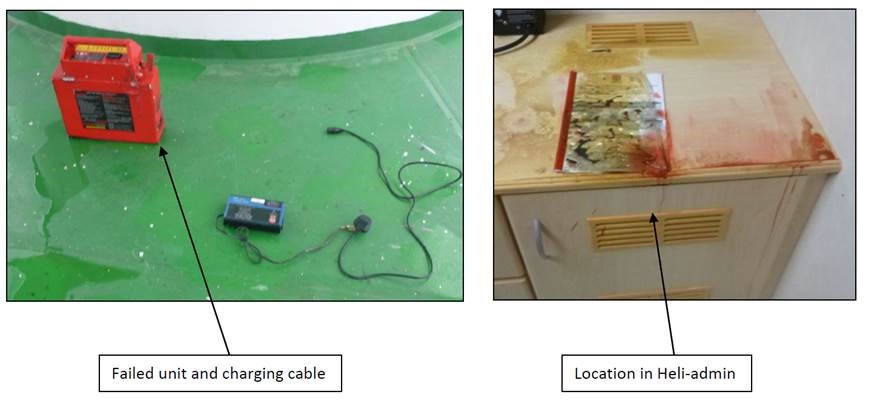Lithium batteries: Fire following the failure of a helicopter start power unit
What happened?
The vessel fire alarm panel indicated an activated smoke detector in the Heli admin office. Upon investigation, crew found the Heli admin office to be filled with smoke; they proceeded to raise the alarm immediately and inform the Bridge. The fire alarm was sounded, and all personnel proceeded to muster. Emergency response teams were assembled and dispatched in full breathing apparatus to investigate the source of the smoke/suspected fire.
This was identified as a Portable Helicopter Start Power Unit (Lithium battery) which was located in the corner of the office and connected to a charging pack. The unit and charger were safely removed and doused with fire hoses until cooled and deemed safe. A quick and professional response from crew prevented any further escalation and the incident resulted in no injuries to personnel.

The unit involved in the incident had been maintained in accordance with a planned maintenance regime and had displayed no signs of defect.
What were the causes?
A suspected failure of unit or charger caused overheating and potential fire hazard. Our member has been in contact with the manufacturer and they suspect a component in the charger failed.
What actions were taken?
- Failed unit was quarantined for safe disposal or returned to manufacturer for investigation;
- The vessel has now established a clearly marked external storage area for old batteries;
- All operators using similar units should ensure they are serviceable and show no signs of defect or deterioration.
What lessons were learnt?
Devices fitted with Lithium batteries such as this should not be left unattended whilst charging. This also applies to personal devices such as laptops, tablets and mobile phones.
Members may wish to refer to:
Safety Event
Published: 28 October 2019
Download: IMCA SF 25/19
IMCA Safety Flashes
Submit a Report
IMCA Safety Flashes summarise key safety matters and incidents, allowing lessons to be more easily learnt for the benefit of all. The effectiveness of the IMCA Safety Flash system depends on Members sharing information and so avoiding repeat incidents. Please consider adding [email protected] to your internal distribution list for safety alerts or manually submitting information on incidents you consider may be relevant. All information is anonymised or sanitised, as appropriate.
IMCA’s store terms and conditions (https://www.imca-int.com/legal-notices/terms/) apply to all downloads from IMCA’s website, including this document.
IMCA makes every effort to ensure the accuracy and reliability of the data contained in the documents it publishes, but IMCA shall not be liable for any guidance and/or recommendation and/or statement herein contained. The information contained in this document does not fulfil or replace any individual’s or Member's legal, regulatory or other duties or obligations in respect of their operations. Individuals and Members remain solely responsible for the safe, lawful and proper conduct of their operations.
